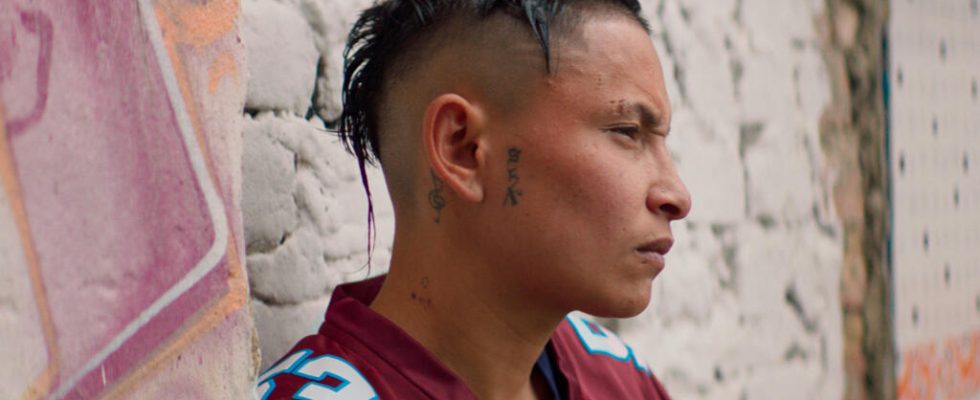This month of March, three Colombian films discovered at the San Sebastian Film Festival are released on French screens last year. Three stories of street teenagers, three issues and three views of filmmakers. A varon by Fabián Hernandez opens the ban this Wednesday, March 15, followed by Eden by Andrés Ramirez Pulido and Los reyes del mundo by Laura Mora at the end of the month. A varon“a male”, questions and denounces a toxic relationship to masculinity and violence.
Carlos walks around in his clothes that are too big for him, swaying his shoulders, hands in his pockets. A slender figure and a thin, discreetly tattooed face, the young boy wanders between the home where he is welcomed – that of the father Javier de Nicolo to whom the film is dedicated- and his district of Santa Fé in the center of Bogota, smashed by bulldozers, where his sister sometimes lodges him.
The film, presented at the Directors’ Fortnight in Cannes last year, opens with a documentary on young people from the hostel who explain to the camera what it is to be a guy, a male, a real one. The street forces you to be tough, it eats you, ” it has tentacles that absorb » ; either you eat, or you get eaten… In this universe of tough guys with a hyper-sexed vocabulary, who play muscles and dumbbells, watch porn videos at night, play the revolver like others on the playstation, we feel Carlos uncomfortable. He too plays tough, gets his head shaved” like a man “. But he also dreams of spending Christmas with his mother -in prison- and his sister Nicole -who is a prostitute-, drawing her lips on a mirror with her sister’s lipstick. An ambiguity that the film suggests, without forcing the line. Carlos doubts, seeks himself.
A cathartic film
None of the actors in the film are professional actors. They are all young people from the neighborhood and we had to ask the gangs who control it for permission to film, explains the director. Dilan Felipe Ramirez Espitia, met at a rap concert, is Carlos and he is amazing, like the others. The dialogues are improvised over the course of the action, the director giving some indications of staging and context. I would say that ” the character of Carlos is a mix between my past and the present of Felipe “, explains Fabián Hernandez, who knows this universe for having been part of it, and having left it.
This first film, matured in previous shorts and worn for ten years, was a kind of catharsis for him. It was a question of bringing and proposing another look at these young people. The device had to be simple: the camera is attentive to faces and feelings. ” I wanted to have only a camera on a tripod. We needed time for the characters to align with their emotions. Let the tears come, the sadness set in. Like in this scene, on Christmas Eve, where lost children are sitting in silence around a fire, in the middle of the ruins.
The refusal to sublimate violence
Fabian Hernandez knows these streets by heart, his parents live in the neighborhood; he knew where to install his camera like in this shot where his friends from the boarding house console Carlos, seated on the sidewalk, and offer him to go and do a bit of “business” with them. Behind them, on the wall, a painting of the three Rapetou, Disney’s thieving dogs. Carlos doesn’t steal or take drugs, but has to deal to support his mother in prison and get his sister off the streets. The family, a buoy to which everyone clings, when they have one. Family, religion, virility… values that the director questions.
To become a real male, Carlos will have to prove himself, until the ultimate test, killing someone. ” It’s no harder than opening a can of sardines », assures him his dealer. The violence, however, most often remains off-screen. No question of filming what young people are watered all day long, assumes Fabián Hernandez: “ in my film, there weren’t going to be any deaths or any sublimation of violence. He prefers to film young people, boys and girls, singing at the top of their voices and dancing to their anthem, that of the street kids: “ I have an angel who protects me… sometimes I walk through a neighborhood in the middle of a shooting and he is behind me…” by Tego Calderon.
Questioning these values and proposing another look, opening the field of possibilities, this is Fabián Hernandez’s purpose. And the message gets through, beautifully.
